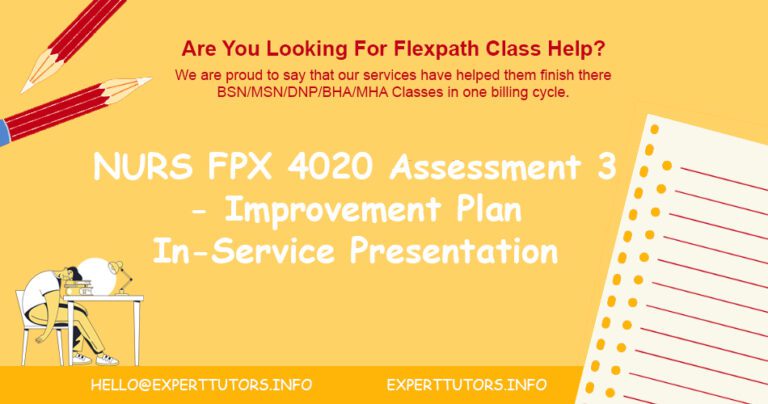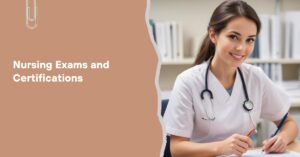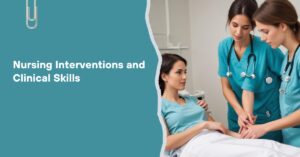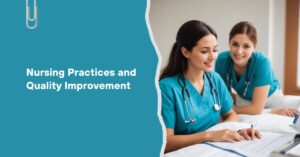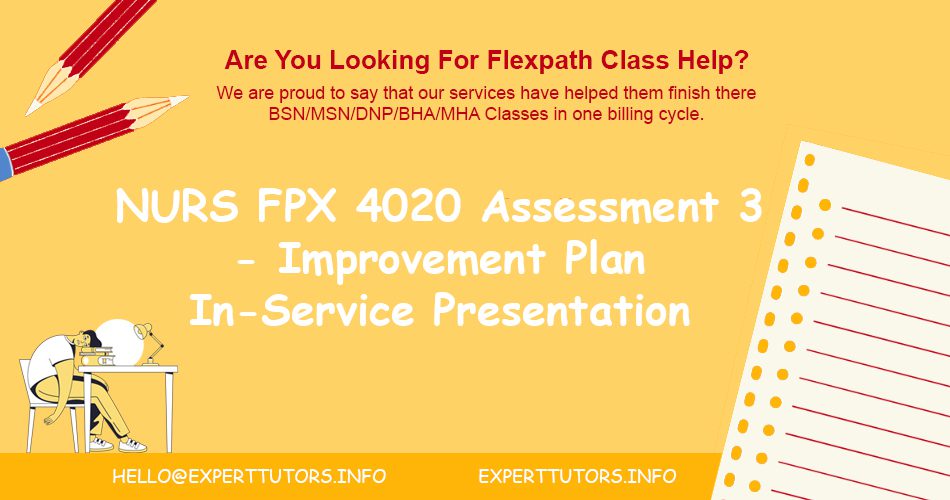NURS FPX 4020 Assessment 3
Name: Capella University
NURS-FPX 4020 Assessment 3
May 2023
Capella 4020 Assessment 3
Table of Contents
ToggleImprovement Plan In-Service Presentation
Slide 1:
Hello, my name is Kevin and I will be presenting an improvement plan in-service to improve the inclusion of healthcare providers for patient’s safety. The presentation focuses on providing insight about safety problems regarding medication management mistakes.
Slide 2:
This targeted study focuses on developing an improvement plan to assist rapid patient recovery without complicating the design. Through implementation of approaches and skills, it signifies different responsibilities of healthcare providers for enhanced patient’s health results and patient care provision.
Agenda and Outcomes of In-service Training
Slide 3:
Patient’s safety is a key priority and a main objective of healthcare workers besides having total well-being. According to this plan, nurses’ education will be provided on safety design to prevent medication mistakes due to various factors i.e., negligence in the administration design. Almost 70% of the medication mistakes occur due to negligence in diagnosis. To avoid mistakes in diagnosis, reason evaluation and critical thinking are required (Tariq & Scherbak, 2023).
Furthermore, diagnosis errors are a main cause of medication errors often which can have deadly outcomes. Thus, the improvement design will enhance the nurses’ insight of medication management, finest practices for patient’s care interventions, responsibility identification for enhancing patient’s health outcomes, acquiring supplementary skills and approaches for patient’s speedy recovery rate. Lastly, assessment and monitoring of patient’s health to avoid intense medication responses or treatment reactions (Hamid et al., 2022).
Results
Slide 4:
For provision of finest quality patient’s intervention, there is a requirement of nurses’ training and re-educating (ten Haken et al., 2021). This plan can help in enhancing the health results with improved nurses’ productivity and increased focus on safety huddles before patient’s treatment, decreased risks of medication mistakes and mortality risks due to technical and diagnosis problems. Nurses’ education will enhance the insights on advanced and current technological tools for distributing and reducing work burden thus improving the response time to patients (Booth et al., 2021).
The focused results of the training are better change and resilient healthcare service provision with best intervention choices and patients’ care (Pollock et al., 2020). Merriel et al., (2019) have highlighted the significance of technical skills and training for nurses to strengthen teamwork and awareness among the healthcare workers. Likewise, this training will ensure coordination and communication capabilities for enhanced learning (Merriel et al., 2019).
NURS FPX 4020 Assessment 3
Knowledge about Medication Mistake
Slide 5:
Over the past years, there is an increase in medication mistakes incidents with reports of 100,000 medication mistakes and 530,000 medication incidents causing nine thousand deaths yearly in the US hospitals (Tariq & Scherbak, 2023). Resultantly, adverse medical situations can be aggravated by medication mistakes for healthcare organizations and nurses particularly if the error has occurred due to negligence in timing, dose, labeling and route of the medicine handling (Alandajani et al., 2022).
Taking the reference of the last assessment, the improvement design is developed to train nurses in appropriate medication routes, labeling, dose, time, and concentration. The administration strategies are categorized as drug routes i.e., subcutaneous, or oral. The choice of drug application is based on application feasibility, drug composition and pharmacokinetics (Homayun et al., 2019). Thus, sufficient nurses’ training and education will give sufficient insight on the route of drug administration.
Several healthcare settings make care providers and patients personally responsible for their medication management which creates multi-aspect mistake risk which is hard to measure. Thus, in-service improvement design is systematic which provides nurses with insights about medication management to prevent adverse and intense medical events.
Safe Medication Administration
Slide 6:
Accurate and safe medication is an important but daunting responsibility for nurses or healthcare workers. It needs extraordinary decision-making abilities and skills while comprehending the duties and its effects on safety of patients (Vaismoradi et al., 2020). Therefore, uninterrupted education of healthcare providers, particularly nurses is needed.
Aspects of Good Quality Care
For making any plan effective and successful, it is important to improve its certain components. Thus, this in-service plan has strategies to decrease mortality rates and improve quality care from the Agency for Healthcare Research and Quality (AHRQ) and the World Health Organization (WHO).
Safety Enhancement Plan
Slide 7:
The requirement of enhanced patient’s safety results related to medication protection are extremely important. Wondmieneh et al., (2020) have highlighted that nurse play an important role in safety checks for medication administration processes which also ensure patient’s well-being (Wondmieneh et al., 2020). Röhsig et al., (2020) stated that there is a need for safety improvement strategies for ensuring finest practices of patients’ healthcare and well-being. Increased work productivity needs sufficient organization, order and guided strategy which is attainable by appropriate safety enhancement design. This enhancement plan trains the nurses in safety measures to reduce the patient’s mortality rate.
The Plan Goals
Medication education is extremely important for both management and diagnosis as highlighted at every step of this plan. The design has three main objectives that will enhance the patients’ care while decreasing mistakes.
Objective 1:
Training the healthcare providers on the basics of patient management. This training will ensure that nurses effectively understand every component of a patient’s health results while strengthening their commitment for curing patients. Nurses’ education of safe medication will enhance their insights on essential care while reducing mistakes (Mardani et al., 2020).
Objective 2:
To convey the mistake occurred due to incorrect medication provision. The mistake can be highlighted by strong communication, insight transfer processes and unity which will highlight the issues, patient-centric solutions and suggestions about alternative medications, order alterations and recording patient’s choices (Godsey et al., 2020). It also includes the tools for providing fine care.
Objective 3:
Technology can improve the care provision. Technological tools are advancing rapidly and combining these with healthcare systems can produce valuable advantages. For reducing diagnosis and prescription mistakes, Health Information Technology (HIT) is an effective tool (Alolayyan et al., 2020). It can inspect and record the medication information in Barcode Medication Administration System (BMAS) (Mulac et al., 2021). It also eases consultation processes by eHealth forums which ensure fine patient’s care.
Audience Role, Importance, and Benefits to the Improvement Plan
Slide 8:
The holistic administrative commission targets at implementing different strategies for checking care quality in healthcare organizations while nurses are the main and important players for hospital’s productivity and safety of patient’s lives (Khomami & Rustomfram, 2019). When nurses are administering the medicines, they can avoid mistakes by concentration which will improve patient’s health outcomes. The focus can be improved by six rights of medication management which are: right time, right dose, right medicine, right record, right patient, and right drug (Hanson & Haddad, 2022).
Due to different human natures, the efficacy of medicines may differ from person to person. Some patients might be allergic to some medicines while some remain non-responsive. Therefore, nurses should focus on drug composition at the documentation step that can have side-effects and allergic reactions (Asmirajanti et al., 2019).
Benefits
If nurses are sufficiently educated and trained, then the finest patient’s safety can be guaranteed. The enhancement designs will assist in acquiring realistic communication abilities to fulfill objectives. However, the plan can be made more effective and improved, ensuring enhanced health results by collecting feedback from nurses (Burgess et al., 2020).
Significance
Feedback is an essential tool for gathering information from nurses to evaluate the plan’s progress, durability, resilience, adaptability and potential barriers.
Skill Development Activities
Slide 9:
A newer opportunity or avenue can open many possibilities for plan’s success which will allow the nurses to give better care treatment in a patient-centric and friendly environment. Therefore, to avoid medication mistakes, nurses should comply with particular strategies and guidelines.
Patient-nurse coordination strategy is an advanced skill to be acquired. This would guarantee effective outpatient drug management (Molina-Mula & Gallo-Estrada, 2020) where patients can be fully aware and comprehend diagnosis and prescription to open up about their individual considerations and histories. This patient-nurse coordination strategy allows nurses to understand something new about job insights and about main events which can affect medication mistakes. It will also allow nurses to learn new technological tools for critical medical specifications in the form of pharmacist-nurse collaboration (Dilles et al., 2021) thus preventing problems in the design.
Practice Activity for Staff
Slide 10:
For improving nurses’ insight and knowledge about patient’s care skills, different simulations and activities were developed (Rouleau et al., 2022). Medication mistakes can also be avoided by improving cognitive abilities of nurses by knowledgeable skills and board games (Fusco et al., 2021). This will also unfold unseen hurdles in patient’s care provision.
Expected Results
Slide 11:
While concluding the training, a positive nurses’ feedback is expected to allow them to efficiently treat patients with reduced medication mistakes, increase interdisciplinary coordination, time management and compliance with patient care guidelines.
Soliciting Feedback
Slide 12:
An online survey form can effectively collect feedback data from the audience and provide education. It will consist of a closed-ended questionnaire with particular metrics for plan’s improvement, success and failure.
Conclusion
Slide 13:
It is important to develop an implementation design for handling medication mistakes. Its progress is identified by nurses’ ability to cope up with adverse incidents and implement finest practices learned by training for enhanced care quality.
References
Alandajani, A., Khalid, B., Ng, Y. G., & Banakhar, M. (2022). Knowledge and Attitudes Regarding Medication Errors among Nurses: A Cross-Sectional Study in Major Jeddah Hospitals. Nursing Reports, 12(4), 1023–1039. https://doi.org/10.3390/nursrep12040098
Alolayyan, M. N., Alyahya, M. S., Alalawin, A. H., Shoukat, A., & Nusairat, F. T. (2020). Health Information Technology and Hospital Performance the Role of Health Information Quality in Teaching Hospitals. Heliyon, 6(10), e05040. https://doi.org/10.1016/j.heliyon.2020.e05040
Asmirajanti, M., Hamid, A. Y. S., & Hariyati, Rr. T. S. (2019). Nursing Care Activities Based on Documentation. BMC Nursing, 18(S1). https://doi.org/10.1186/s12912-019-0352-0
Booth, R. G., Strudwick, G., McBride, S., O’Connor, S., & Solano López, A. L. (2021). How the nursing profession should adapt for a digital future. BMJ, 373(373), n1190. https://doi.org/10.1136/bmj.n1190
Burgess, A., Van Diggele, C., Roberts, C., & Mellis, C. (2020). Feedback in the clinical setting. BMC Medical Education, 20(S2). https://doi.org/10.1186/s12909-020-02280-5
Dilles, T., Heczkova, J., Tziaferi, S., Helgesen, A. K., Grøndahl, V. A., Van Rompaey, B., Sino, C. G., & Jordan, S. (2021). Nurses and Pharmaceutical Care: Interprofessional, Evidence-Based Working to Improve Patient Care and Outcomes. International Journal of Environmental Research and Public Health, 18(11), 5973. https://doi.org/10.3390/ijerph18115973
Fusco, L. A., Alfes, C. M., Weaver, A., & Zimmermann, E. (2021). Medication Safety Competence of Undergraduate Nursing Students. Clinical Simulation in Nursing, 52, 1–7. https://doi.org/10.1016/j.ecns.2020.12.003
Godsey, J. A., Houghton, D. M., & Hayes, T. (2020). Registered nurse perceptions of factors contributing to the inconsistent brand image of the nursing profession. Nursing Outlook, 68(6), 808–821. https://doi.org/10.1016/j.outlook.2020.06.005
Hamid, A. A. A., Rahim, R., & Teo, S. P. (2022). Pharmacovigilance and Its Importance for Primary Health Care Professionals. Korean Journal of Family Medicine, 43(5), 290–295. https://doi.org/10.4082/kjfm.21.0193
Hanson, A., & Haddad, L. M. (2022). Nursing Rights of Medication Administration. PubMed; StatPearls Publishing. https://www.ncbi.nlm.nih.gov/books/NBK560654/
Homayun, B., Lin, X., & Choi, H.-J. (2019). Challenges and Recent Progress in Oral Drug Delivery Systems for Biopharmaceuticals. Pharmaceutics, 11(3), 129. https://doi.org/10.3390/pharmaceutics11030129
Khomami, H., & Rustomfram, N. (2019). Nursing efficiency in patient care: A comparative study in perception of staff nurse and hospital management in a trust hospital. Journal of Family Medicine and Primary Care, 8(5), 1550. https://doi.org/10.4103/jfmpc.jfmpc_37_19
Mardani, A., Griffiths, P., & Vaismoradi, M. (2020). The Role of the Nurse in the Management of Medicines During Transitional Care: A Systematic Review. Journal of Multidisciplinary Healthcare, 13(13), 1347–1361. https://doi.org/10.2147/JMDH.S276061
Merriel, A., Ficquet, J., Barnard, K., Kunutsor, S. K., Soar, J., Lenguerrand, E., Caldwell, D. M., Burden, C., Winter, C., Draycott, T., & Siassakos, D. (2019). The effects of interactive training of healthcare providers on the management of life-threatening emergencies in hospital. Cochrane Database of Systematic Reviews. https://doi.org/10.1002/14651858.cd012177.pub2
Molina-Mula, J., & Gallo-Estrada, J. (2020). Impact of Nurse-Patient Relationship on Quality of Care and Patient Autonomy in Decision-Making. International Journal of Environmental Research and Public Health, 17(3), 835. https://doi.org/10.3390/ijerph17030835
Mulac, A., Mathiesen, L., Taxis, K., & Gerd Granås, A. (2021). Barcode medication administration technology use in hospital practice: a mixed-methods observational study of policy deviations. BMJ Quality & Safety, 30(12), 1021–1030. https://doi.org/10.1136/bmjqs-2021-013223
Pollock, A., Campbell, P., Cheyne, J., Cowie, J., Davis, B., McCallum, J., McGill, K., Elders, A., Hagen, S., McClurg, D., Torrens, C., & Maxwell, M. (2020). Interventions to Support the Resilience and Mental Health of Frontline Health and Social Care Professionals during and after a Disease outbreak, Epidemic or pandemic: a Mixed Methods Systematic Review. The Cochrane Database of Systematic Reviews, 11(11), CD013779. https://doi.org/10.1002/14651858.CD013779
Röhsig, V., Maestri, R. N., Parrini Mutlaq, M. F., Brenner de Souza, A., Seabra, A., Farias, E. R., & Lorenzini, E. (2020). Quality improvement strategy to enhance compliance with the World Health Organization Surgical Safety Checklist in a large hospital: Quality improvement study. Annals of Medicine and Surgery, 55, 19–23. https://doi.org/10.1016/j.amsu.2020.04.027
Rouleau, G., Gagnon, M.-P., Côté, J., Richard, L., Chicoine, G., & Pelletier, J. (2022). Virtual patient simulation to improve nurses’ relational skills in a continuing education context: a convergent mixed methods study. BMC Nursing, 21(1). https://doi.org/10.1186/s12912-021-00740-x
Tariq, R. A., & Scherbak, Y. (2023, February 26). Medication dispensing errors and prevention. National Library of Medicine; StatPearls Publishing. https://www.ncbi.nlm.nih.gov/books/NBK519065/
ten Haken, I., Ben Allouch, S., & van Harten, W. H. (2021). Education and training of nurses in the use of advanced medical technologies in home care related to patient safety: A cross-sectional survey. Nurse Education Today, 100, 104813. https://doi.org/10.1016/j.nedt.2021.104813
Vaismoradi, M., Tella, S., A. Logan, P., Khakurel, J., & Vizcaya-Moreno, F. (2020). Nurses’ adherence to patient safety principles: A systematic review. International Journal of Environmental Research and Public Health, 17(6), 1–15. https://doi.org/10.3390/ijerph17062028
Wondmieneh, A., Alemu, W., Tadele, N., & Demis, A. (2020). Medication administration errors and contributing factors among nurses: a cross sectional study in tertiary hospitals, Addis Ababa, Ethiopia. BMC Nursing, 19(4), 1–9. https://doi.org/10.1186/s12912-020-0397-0
